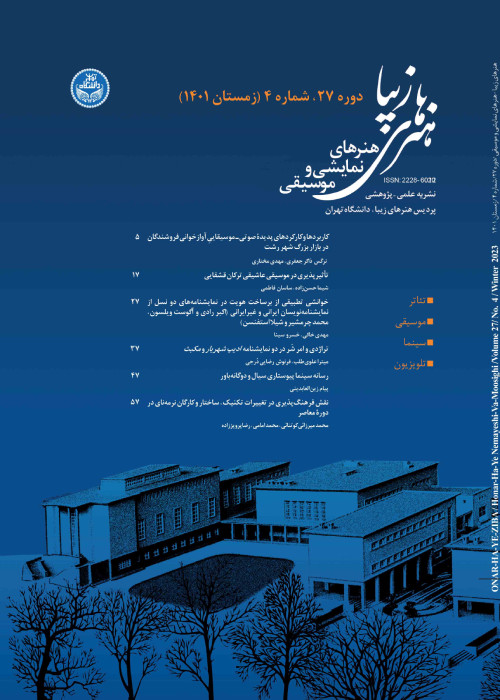Join of the Public Sphere and Conversation Rules Through Looking at Three Plays of Esmaeel Khalaj
Author(s):
Article Type:
Research/Original Article (دارای رتبه معتبر)
Abstract:
The Public Sphere is the gathering of individuals at the same time and same place for conversation, as a prerequisite of its being. The aim of the conversation is to reach a rational consensus and influence the decisions of a governing body. Conversation is a primary element of communication, which serves a purpose for achieving our common goals. Lifestyle and culture effect the means and effectiveness of communication. Iranian people have a different life style compared to Europeans, thus, the process of their communication and conversation is also different. The Teahouse has been considered one example of Iranian public sphere by Jurgen Habermas, a contemporary German philosopher. The Public Sphere had existed in Iranians' teahouses throughout the Safavid, Qajar and Pahlavi eras. Citizens could come to these places, drink or eat, meet others and talk about everything freely and fearlessly. It was an opportunity to work out, decide and settle pending problems and social – political issues. But Teahouses have been under the pressure and control of governments and have not had a continual, dynamic and useful existence. This research tried to associate the theory of Public Sphere to the realm of Iranian plays. Three plays of Esmaeel Khalaj namely Goldoune Khanoum, Jom'eKoshi, Mastaneh, which take place in teahouses and bars, were selected. The aim was to analyze the speculation about existence or non-existence of the public sphere from 1922 to 1932 within these oeuvres. Each dialogue has been analyzed by parameters of correct conversation in the theory of Public Sphere. This research was done through descriptive and analytical method. First the necessities of Public Sphere's formation have been presented, and then conversation as a prerequisite for the formation of the public sphere has been analyzed and the quantity and quality of that necessities have been compared to the aforementioned plays. The results reveal that the concept of the Public Sphere is not effective among the characters of these three plays. The most important cause of this absence is lack of rules and manners of conversation. The characters do not know how to convert their speeches and confabulation to directed conversation; a conversation model that can have some effective output for them. They do not have any practice in conversation and communication skills, due to their lifestyle and background which is mentioned as a contributing factors. Lack of directed, specific and constructive conversation among the characters’ results in a disconnection between the government and its citizens. The government is not aware of the demands of the citizens, so the vital social problems of the people remain in their own Private Sphere. In other words, Avoidance of logical reasoning and the tendency to confabulate are obstacles that prevent the art of conversation from becoming an act of dialogue. Lack of conversational skills in the characters of these plays, cause a monotonous life for them, a representation of lifestyle in the capital of Iran during the 1920s to 1930s.
Keywords:
Language:
Persian
Published:
Honar-Ha-Ye-Ziba: Honar-Ha-Ye Mosighi Va Namayeshi, Volume:27 Issue: 75, 2022
Pages:
45 to 54
magiran.com/p2508990
دانلود و مطالعه متن این مقاله با یکی از روشهای زیر امکان پذیر است:
اشتراک شخصی
با عضویت و پرداخت آنلاین حق اشتراک یکساله به مبلغ 1,390,000ريال میتوانید 70 عنوان مطلب دانلود کنید!
اشتراک سازمانی
به کتابخانه دانشگاه یا محل کار خود پیشنهاد کنید تا اشتراک سازمانی این پایگاه را برای دسترسی نامحدود همه کاربران به متن مطالب تهیه نمایند!
توجه!
- حق عضویت دریافتی صرف حمایت از نشریات عضو و نگهداری، تکمیل و توسعه مگیران میشود.
- پرداخت حق اشتراک و دانلود مقالات اجازه بازنشر آن در سایر رسانههای چاپی و دیجیتال را به کاربر نمیدهد.
In order to view content subscription is required
Personal subscription
Subscribe magiran.com for 70 € euros via PayPal and download 70 articles during a year.
Organization subscription
Please contact us to subscribe your university or library for unlimited access!



